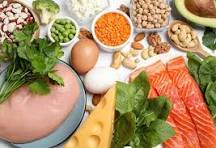
Dear reader,
To summarize this long post: Proteins can be a source for energy intake, but….. their main job is being ‘building blocks of life’ and working hard on hormones, enzymes, body tissues, and immunity. Latest research states that we should more or less double earlier traditional guidelines, up to 1.5 grams per kilo body weight and spread your intake during the day. Which is not always easy! Two side notes. 1. Do not eat farmed fish. 2. Do not get fragile when you age; exercise and eat your protein.
1. Energy first (=carbs and fats)
The three groups of macro-nutrients are the center of many discussions about nutrition. I refer of course to fats, carbs (hydro-carbonates) and proteins. Fats and carbs are your main sources for energy-intake: carbs 4 kcal per gram and fat 9 kcal per gram. Our body needs energy (average 2000 kcal daily) and carbs and fats happily and rather easily provide this. Health-wise, there is of course much more to carbs and fats. Yet, their main task is to supply energy and as such the preferred choice of your body.
2. Building blocks first (=proteins)
Giving energy is, as mentioned, not the main job for proteins. Still, they will become an energy choice when carbs and fats are not available. During prolonged exercise or starvation, they provide 4 kcal per gram, just like carbs. Nonetheless, your body really prefers proteins for other important jobs. These include building and repairing tissues, making enzymes and hormones, and supporting immune role. They are not called ‘building blocks of life” for nothing!
3. Some Facts and Figures for those who really want to be in the know
There are 20 amino acids. Nine are “essential”, meaning that your body does not produce them and can only get them by eating. “Essential” is a confusing term but it is as it is.
All proteins are made up of long chains of amino acids linked by peptide (= chemical) bonds. The specific sequence of amino acids determines the protein’s structure and function.
The 20 amino acids are transformed into tens of thousands of proteins in your body. Actually it is more complicated. First, you eat proteins, which can be animal or plant-based. Then, your body breaks them down into amino acids. Finally, it rebuilds them into the specific proteins you need. Yes, complicated, but that is how nature often works :).
In the end, we have tens of thousands of different proteins in our body. Each one has unique structures and functions. We need all of them. The exact number can vary. However, estimates often suggest that there are over 20,000 protein-coding genes in the human genome (= genetic blueprint). These genes can produce (= synthesize) multiple different proteins through various biological processes.
4. Need to know: how many proteins per gram produce?
I love nuts and fortunately they give on average 20 grams of protein per 100 grams. Meat and chicken even more; I do not eat meat, except organic chicken a few times per week. Fatty fish like salmon, cod (leaner), and sardines offer 20 – 25 grams. Vegetables only give 2 grams. Fruits have less than 1 gram. Two eggs (100 grams) contain 13 grams of protein. Looking at this rough overview one sees the challenge with plant proteins. You really need to eat a lot to get enough. Vegetarians should in my opinion seriously consider taking supplements.
5. Differences between animal and plant proteins
Animal proteins are “complete.” They contain all nine essential amino acids, meaning that your body does not produce them. Common dietary sources include meat, fish, poultry, eggs, and dairy.
Most plant proteins, on the contrary, are “incomplete.” They are missing one or more of the nine essential amino acids. There are a few exceptions like quinoa and soy. Yet, by combining plant proteins (e.g., beans and rice) you can get all the nine essential amino acids.
Animal proteins are easier to digest for some people and come with distinct nutrients—like omega-3 from fatty fish. Plant proteins can be more difficult to digest but also comes with extra benefits, like providing the all important fiber.
High plant protein intake appears linked to lower chronic disease risks like heart disease and certain cancers. Conversely, there are links between high intake of animal proteins (especially red and processed meats) and higher chronic disease risks.
6. Risks of an overdose
Over consumption of proteins can lead to health risks. Over consumption is subjective and difficult to define as it varies per person. Still, consuming more than 2 grams of proteins per kilogram over an extended period can harm your health. How much is too much also depends on your lifestyle, health history, and protein quality.
What I read on internet is that most risks include negative impacts on kidneys and dehydration. It also effects calcium intake which can lead to bone problems. Other risks are weight gain and heart issues, especially from excessive red and processed meat intake.
7. My personal protein approach
On a typical day, I obtain around 65 grams of proteins from my diet. I get 20 grams from fish or chicken and 20 grams from nuts. As said I do not eat meat. There are 15 grams from low fat French quark and 10 grams from other sources. To reach 120+ grams, I rely on carefully chosen plant-based supplements that include all nine essential amino acids. I personally stay well below 2 grams proteins per kilogram. Fortunately, it is not easy to overdose on protein through regular diet alone; only supplements make it possible.
For solid information on the necessity of increasing protein intake, search for Thomas deLauer on YouTube. He has almost 4 million subscribers.
Tip: spread protein intake over the day. The ideal intake is 20 – 25 grams per session as your body will only process this amount. Space the intake and take the next one at least a few hours later.
8, Side note 1, on fish: I’ve stopped eating farmed fish like tilapia, shrimp, or salmon. I am concerned about antibiotic use in fish farming. Kim and I prefer wild salmon (despite the higher cost), Atlantic cod, sardines and Dutch herring of course!
9. Another side note, on loss of muscle: do not get fragile when you age.
One can not overestimate the importance of healthy tissues regarding healthy aging. Protein serves a crucial task. It constructs and repairs “tissues,” which include muscles, hair, skin, and organs. Physical exercises including resistance training and adequate protein intake supplement reinforce each other.
Maintaining an excellent muscle system, including hard work to stop loss of muscles (sarcopenia) is central. Muscles and physical exercises are a favorite topic of my blogs. Neglecting your muscles is related to so many potential health problems. This is especially true the older you get. For many reasons. Recent studies for example point to a correlation between weak muscles and a higher chance for dementia.
Ok, enough on proteins. Lead a happy and healthy life,
Robert, your health friend

Kijkduin beach
Discover more from Health Project 99+ (in good shape)
Subscribe to get the latest posts sent to your email.

One thought on “5. POWER TO THE PROTEINS, AND ALSO…. ENOUGH IS NOT ALWAYS ENOUGH (health project 99+)”